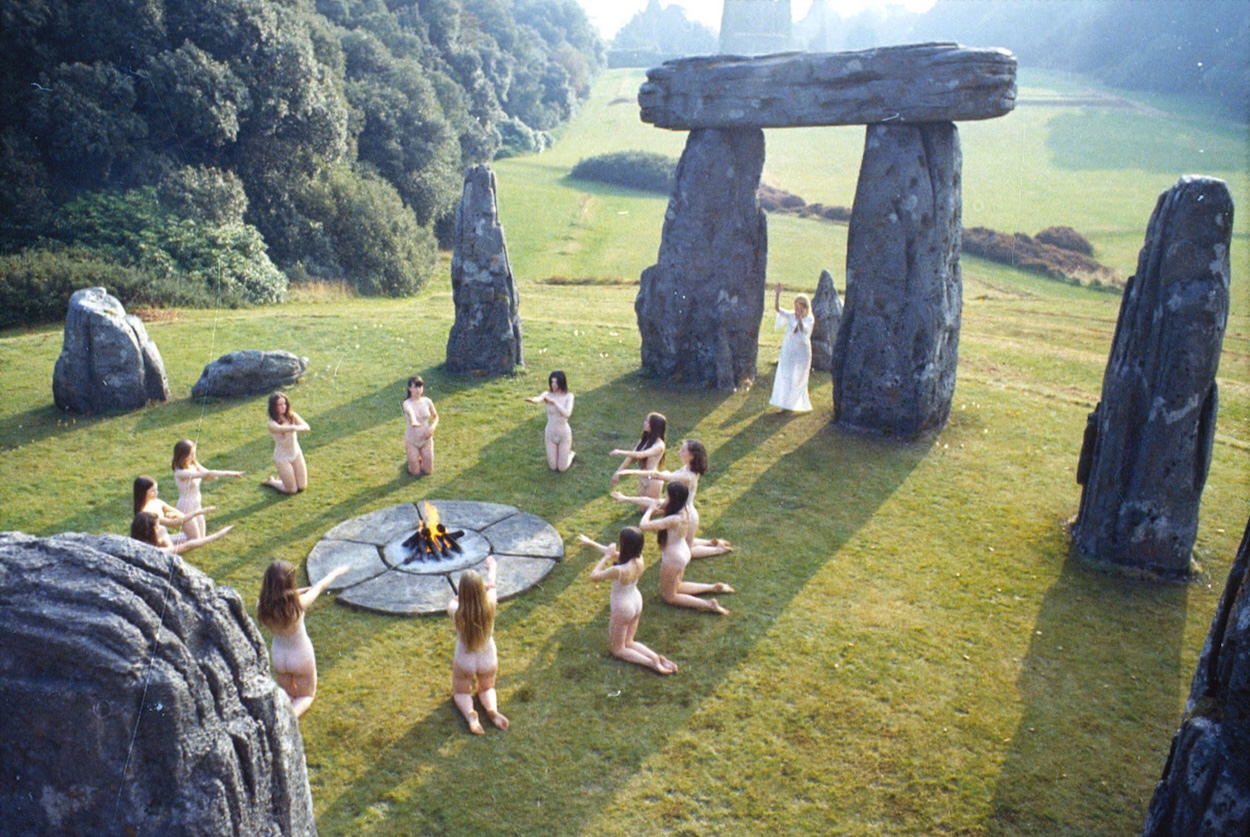Built in the 1840s, St Giles’s Church in Camberwell bills itself as south-east London’s ‘most stunning Neo-Gothic performance venue’. A niche category, admittedly, but when it comes to hosting events, it’s certainly a broad church. Downstairs, the crypt serves as one of south London’s best jazz clubs. Upstairs, in between services, weddings and funerals, the pews often double as cinema seats, with a film screen erected in the chancel.
Jesus Christ Superstar, perhaps? Conclave maybe, with a trigger warning about papal scheming? Far from it. The latest offering was the 1973 horror classic The Wicker Man, all about the remote Scottish island that rejects God’s message. Some 250 people packed into the church recently for a special screening, watching scenes of paganism and human sacrifice against a backdrop of stained-glass windows designed by John Ruskin.
The screening was organised by Secret Ceremony, a pop-up film club that specialises in showing ‘supernatural masterpieces’ in suitably atmospheric settings. What surprised me most, though, wasn’t that the vicar had allowed it to be screened (a screening at Derby Cathedral a few years ago caused protests from churchgoers). Instead, it was the congregation that had turned up to watch it.
Rather than just ageing male horror buffs like me, reliving their seventies childhoods, the pews were filled with Gen-Zers and Millennials, the kind more regularly found in the hipster bars and hangouts of nearby Peckham. These are devotees of the new genre of folk horror, whose appetites were whetted by Midsommar, and for whom the best scares are to be found not 28 Years Later, but in the past. After all, who needs zombies, aliens and post-apocalyptic wastelands, when our own history has witchcraft, ancient curses and sinister villagers sporting antlers?
This summer saw the genre go arthouse, with the cinema release of Harvest, a brutal tale of life in a medieval Scots village adapted from the Booker prize-nominated novel by Jim Crace. There’s nudity, barn-burning, and miscreants thrown in the stocks, against the backstory of the Highland Clearances. But the grand-daddy of all folk horror remains The Wicker Man – despite its licentious, libidinous content that might seem at odds with our more censorious times.
After all, showings of the film were being cancelled long before cancel culture was invented – such as the very first time I tried to watch it on TV back in 1991. Just as it was due to start, the continuity announcer said that due to ongoing coverage of the Orkney satanic abuse scandal, it was ‘inappropriate’ to screen the film at that time.
The Orkney satanic abuse scandal, for those too young to remember it, was an inquiry into claims that islanders were taking children to satanic sex ceremonies in a quarry. As it turned out, these lurid scenarios existed only in the mind of an over-imaginative social worker – a textbook case of Satanic panic. That, however, did not deter the TV censors, who decided it was best to err on the safe side. Irritating as it was, I could see their point when I did finally watch the film years later.
The Wicker Man seems to symbolise much of what was going amiss in the 1970s, when hippy-era permissiveness began to stray into darker territory. The scenes of schoolgirls being taught that the maypole is a phallic symbol – ‘venerated in religions such as ours’ – are uncomfortable viewing. And while it’s supposed to just be hearty pagan bawdiness, most of us still wince at the lyrics of ‘The Landlord’s Daughter’, sung by the lecherous old men in the island’s Green Man Inn. ‘And when her name is mentioned, the parts of every gentleman do stand up at attention….’
Indeed, short of a cameo by Jimmy Savile in the Green Man chorus line, the film has enough to merit a raft of trigger warnings, and could easily be about as fashionable now as Blaxploitation and Carry On flicks. Why, then, was a new generation of fans taking up the pews?
Secret Ceremony’s founder, the journalist and author Nina-Sophia Miralles, traces it to the wider rekindling of interest in religion among the young. Depending on who you ask, the spur could be the pressures of the digitised world, the rise of Donald Trump, post-Covid ‘pan-xiety’, or just a general sense of global anomie. While more Gen-Zers are indeed going to church, they aren’t all turning into new versions of Sergeant Howie, The Wicker Man’s stern Protestant policeman. Many are equally interested in the pagan rituals that predated Christianity in Britain, before the globalising spread of ‘big religion’.
These are devotees of the new genre of folk horror, whose appetites were whetted by Midsommar
‘I think there’s a backlash against globalisation of the past few decades, and it’s always exciting to go against whatever your parents did,’ says Miralles, 32. ‘At the same time, there’s great disillusionment over what we were promised the world would become, and a hunger for community. Paganism was what you might call a “kitchen sink” religion, practised through individual families, and handed down over the generations – all these elements speak to people’s desire for belonging.’
On that note, Secret Ceremony screenings try to foster a sense of fraternity, a welcome change for a generation used to watching Netflix alone on a laptop. Each screening is a mix of movie and club night. At St Giles, for example, guests were encouraged to ‘don high-end hippy dress’, while a folk-rock band, Painted Bird, played a set beforehand, flanked by white-gowned damsels bearing candles. There are books and pamphlets on sale, a pop-up bar, and conversation is encouraged. After the screening, when audience, band and damsels alike piled into the pub around the corner, I found myself chatting about the film with total strangers, as if we were regulars at the Green Man Inn. I never do that after a night at the local Peckham multiplex.
Part of the film’s appeal, my fellow drinkers and I agreed, was that unlike most horror films, the devil gets some of the best lines. Lord Summerisle, the pagan leader played by Christopher Lee, is a much suaver, more genial character than the uptight Sergeant Howie. With its midsummer orgies, festivals and sing-songs down the pub, the pagan lifestyle looks far more fun than Howie’s dour Scottish Presbyterianism. Indeed, in the 19th century, the arrival of stern Protestant ministers made life a misery on remote Scottish islands like St Kilda, where crofters spent so many hours in church that they barely had time to farm and fish.
Talking of preaching, that brings us to another aspect of The Wicker Man’s appeal. As Miralles points out, in an era where most people have grown up being taught that ‘everything about Britain was bad’, our ancient pre-Christian past, when we were invaded rather than invaders, is a guilt-free zone to explore. As for all the bawdiness and drunkenness – perhaps it proves that Gen-Z aren’t as prudish as people say.
‘At one end, the film is just a bit of fun,’ says Maya Sall, the 25-year-old co-founder of Secret Ceremony. ‘But for some people, it’s also a bit of a liberation from cancel culture – they’re watching something outrageous on screen, but they’re not responsible for it, so there are no consequences.’
‘We get labelled as this boring generation, because we go out less, we drink less, have less sex. But it’s far from true of everyone, and besides, the reason for it is that people’s economic situations aren’t that easy.’
True, even the gloomiest, most pagan-curious Gen-Zers seem unlikely to start making human sacrifices to improve their prospects – and broad-minded as the vicar of St Giles clearly is, he might draw the line at that. But when it comes to filling church pews – and bringing different generations together – it seems that nothing works quite like an appointment with The Wicker Man.
Secret Ceremony’s next film screening will be Endless Poetry, by the avant-garde filmmaker Alejandro Jodorowsky, in Spitalfields on Tuesday 9 September.








Comments